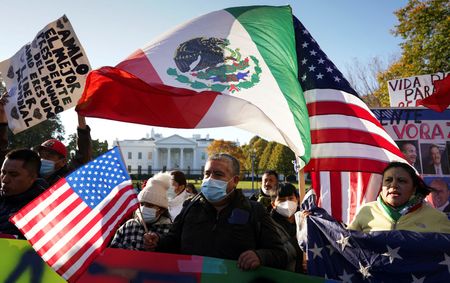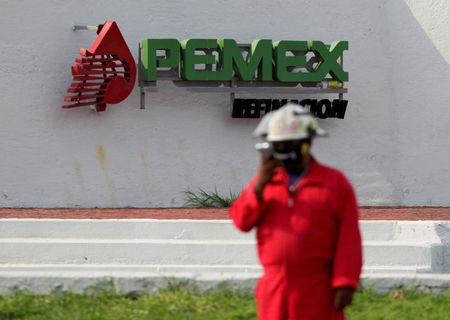By Isabel Woodford
MEXICO CITY (Reuters) – The leaders of the United States, Canada and Mexico are due to hold a summit next week, where a major bone of contention could be a dispute centering on whether Mexico breached a trade pact by tightening state control of its energy market.
WHERE DOES THE DISPUTE STAND?
Tensions over Mexico’s nationalist policies boiled over into a formal dispute in July, when the Washington and Ottawa filed a complaint against Mexico under the United States-Mexico-Canada Agreement (USMCA) trade deal.
The complaint argued Mexican President Andres Manuel Lopez Obrador’s efforts to change the market to favor state oil company Petroleos Mexicanos (Pemex) and national power utility Comision Federal de Electricidad (CFE) had discriminated against U.S. and Canadian companies.
The companies also complained that bureaucratic delays are stymieing their operations.
Dispute resolution talks began, and although progress has been halting, the United States and Canada last year agreed to extend the process beyond an initial 75-day window.
Under USMCA, if the controversy is not resolved during consultations, a dispute panel can be called to adjudicate.
WHAT IS MEXICO’S DEFENSE?
Lopez Obrador has put on a bullish front, saying Mexico has broken no laws and that “nothing is going to happen.”
It comes after he overhauled the electricity market in the name of national sovereignty, giving CFE priority over private companies in connecting power stations to the grid.
Often couching his opposition to foreign and private participation in the energy sector as part of his drive to eradicate corruption, he argues past governments skewed the market in favor of private capital.
He also says that energy is a domestic matter, and points to an article he had inserted into USMCA stipulating Mexico’s “inalienable” ownership of its oil and gas. Critics say the article does not cover his treatment of foreign firms.
CAN MEXICO FIX THE DISPUTE?
Most analysts predict Mexico would lose if a panel is asked to resolve the dispute. That could be very costly to Mexico, raising the prospect of punitive U.S. tariffs.
Both countries have previously stressed that they want to sort out the disagreement before it reaches a panel.
Talks slowed down after Mexico’s economy minister resigned in October, and her successor cleared out several experienced trade negotiators, leaving an inexperienced team in charge.
The new teams says it has put forward proposals that could deal with two of the four areas of consultations, and that they are also addressing other U.S. concerns. But there has been little clear indication of meaningful progress.
Resolution appears to hinge on whether energy nationalists inside the Mexican administration, who have taken their cues from Lopez Obrador, are prepared to compromise.
WHAT ARE MEXICO’S BARGAINING CHIPS?
Lopez Obrador has made energy policy a cornerstone of his presidency, making it hard for him to back down.
His administration is also mindful that Mexico’s assistance on tackling illegal immigration tends to carry more weight in Washington due to its prominence in U.S. domestic politics, giving the government tacit, if unstated, leverage.
Also, Mexican industry is so heavily integrated with the U.S. economy that a trade conflict could be painful for both countries at a time the region is attempting to reduce its reliance on Asia and bring down soaring inflation.
Still, the spat has hit investor confidence in Mexico, and Lopez Obrador is seeking U.S. help to finance solar power output in northern Mexico and attract investment in greener manufacturing, particularly in carmaking, a key industry.
(Reporting by Isabel Woodford; Editing by Dave Graham and Marguerita Choy)


